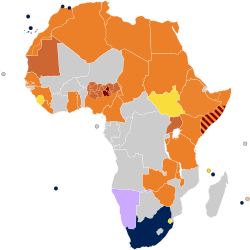Recognition of same-sex unions in Nigeria
This article needs to be updated. (June 2013) |
|
LGBT portal |
|---|
Nigeria recognizes neither same-sex marriages nor civil unions for same-sex couples. Homosexuality can land men up to 14 years in prison in Southern Nigeria and can even result in capital punishment for men in areas under Sharia Islamic Law. Proposals to constitutionally ban same-sex marriage that are compacted with severe penalties to those convicted of performing or participating in such have twice surfaced.
On January 18, 2007 the Federal Executive Council approved a law, Same Sex Marriage (Prohibition) Act 2006, prohibiting same sex marriages and sent it to the National assembly for urgent action. According to the Minister of Justice, Chief Bayo Ojo, the law was pushed by President Olusegun Obasanjo following the international conference on HIV/AIDS (ICASA) in 2005.
The proposed bill calls for five years imprisonment for anyone who undergoes, "performs, witnesses, aids, or abets" a same-sex marriage. It would also prohibit any display of a "same-sex amorous relationship" and adoption of children by gays or lesbians.[1] The bill is expected to receive little or no opposition in Parliament. The same-sex marriage ban would make Nigeria the second country in Africa to criminalize such unions. In 2005, the Ugandan constitution was amended to ban same-sex marriage.[2]
The same bill would also call for five years imprisonment for involvement in public advocacy or associations supporting the rights of lesbian and gay people. Included in the bill is a proposal to ban any form of relationship with a gay person. The intent of the bill is to ban anything remotely associated with being 'gay' or just gay in the country.[3]
In February 2006, the United States State Department condemned the proposal. In March 2006, 16 international human rights groups signed a letter condemning the bill, calling it a violation of the freedoms of expression, association and assembly guaranteed by international law as well as by the African Charter on Human and Peoples' Rights and a barrier to the struggle against the spread of AIDS. Some sources claim that Nigeria has the world's third-highest population of persons with AIDS: 3.6 million Nigerians are infected with HIV.[citation needed]
Same Sex Marriage (Prohibition) Act of 2013[]

In 2008, the Same Gender Marriage Prohibition bill came up before the Senate, the bill was passed in 2013 after a series of amendments. Nigeria is a nation opposed to homosexuality[4] and the passage of the bill received little opposition from the people. The bill voids marriage contracts between people of the same sex and persons aiding and abetting same sex marriages. However, there already existed a bill criminalizing homosexuality and questions were raised about the importance of the new bill.[4] The major difference is that, the bill went further than the previous criminal and penal codes by prohibiting same sex marriages and actions aiding same sex unions by Nigerian citizens. Persons witnessing, officiating or supporting gay acts or weddings can be charged in court. The law is a way to use scare tactics to discourage same sex unions.[citation needed]
In 2018, LGBT activists who have worked extensively in the country on LGBT issues and court cases involving LGBT persons all agree that the law has never been used to convict anyone in any homosexuality-related cases. This, they believe, is because the law itself is incoherent. In addition, many cases involving suspected LGBT persons lack proper evidence and sometimes there’s no evidence at all. That makes it impossible for prosecutors to present a winnable case and prove that any crime has been committed.[5]
In October 2020, LGBT activists also used the EndSARS and EndPoliceBrutality protests in Nigeria to demand an end to marginalization of gay, lesbian, bisexual, and transgender people in Nigeria.[6]
See also[]
- LGBT rights in Nigeria
- Same Sex Marriage (Prohibition) Act 2006
- Recognition of same-sex unions in Africa
References[]
- ^ "Nigeria: Obasanjo Must Withdraw Bill to Criminalize Gay Rights", Reuters AlertNet. March 23, 2006. URL accessed on March 26, 2006
- ^ Uganda bans same-sex marriage
- ^ Sogunro, Ayo. "Why You Should Be Worried About Nigeria's Anti-Gay Law". ayosogunro.com. Retrieved 20 March 2014.
- ^ Jump up to: a b Adetoun Teslimat Adebanjo. (2014). Culture, morality and the law: Nigeria’s anti-gay law in perspective. International Journal of Discrimination and the Law December 2015 vol. 15 no. 4 256-270
- ^ https://76crimes.com/2018/12/15/6-surprising-facts-about-nigerias-anti-gay-marriage-law/
- ^ https://i-d.vice.com/en_uk/article/g5pz9q/nigerias-queer-youth-and-the-endsars-protests/
- LGBT rights in Nigeria
- Nigerian law
- Recognition of same-sex relationships by country
